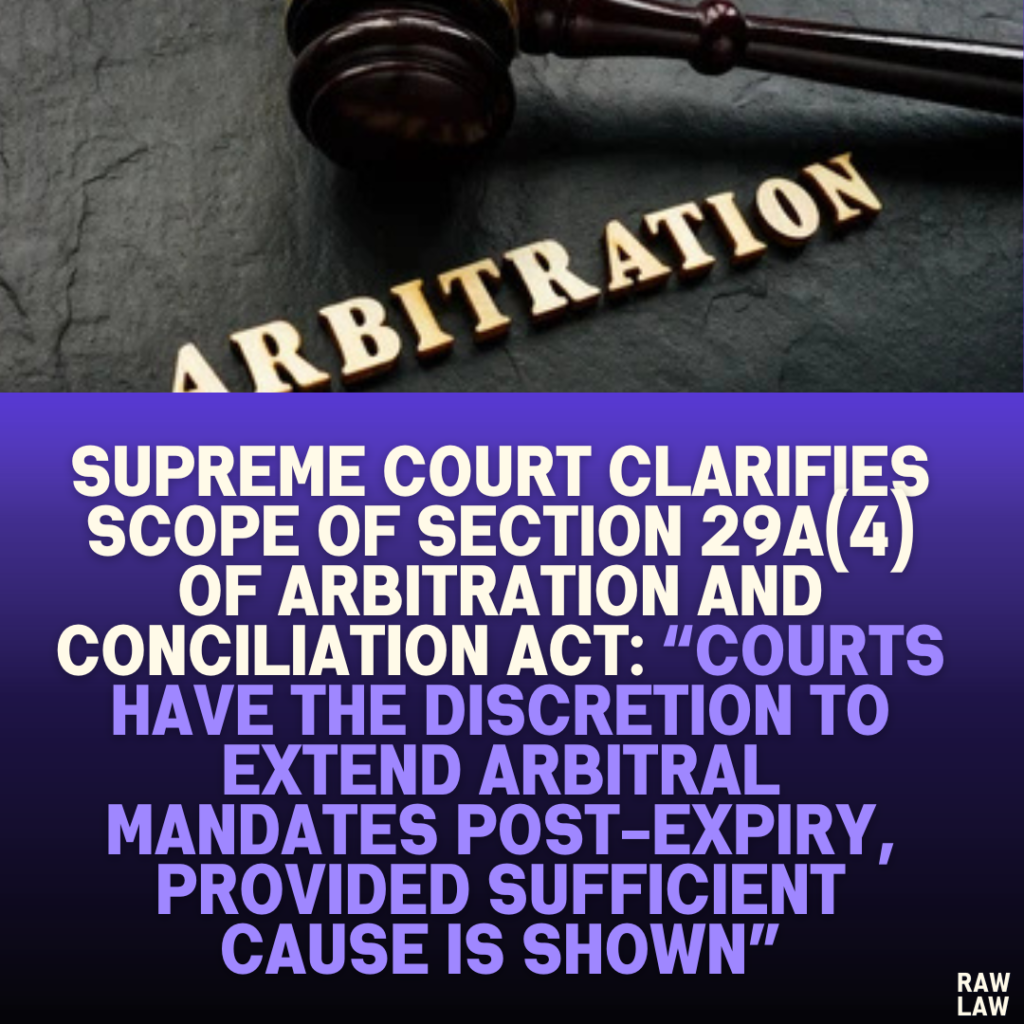Court’s Decision
The Supreme Court ruled that under Section 29A(4) of the Arbitration and Conciliation Act, 1996, an application to extend the mandate of an arbitral tribunal can be filed even after the statutory or mutually extended period has expired. The Court held that delays caused by the COVID-19 pandemic constituted “sufficient cause” to justify such an extension. Consequently, the arbitral tribunal’s mandate was extended until December 31, 2024.
Facts
- The appellant had entered into a works contract with the respondent, leading to disputes that were referred to arbitration. A sole arbitrator was appointed by the High Court in February 2019.
- Pleadings were completed on October 9, 2019, triggering the 12-month timeline under Section 29A(1) for the arbitral award. By mutual consent, the period was extended for an additional 6 months, expiring on April 9, 2021.
- However, the COVID-19 pandemic disrupted the proceedings. The Supreme Court’s order in Re: Cognizance for Extension of Limitation excluded the period from March 15, 2020, to February 28, 2022, from statutory limitation calculations.
- Arbitration hearings resumed in 2022, concluding on May 5, 2023. The appellant filed an extension application under Section 29A(4) in August 2023, after the tribunal’s mandate had expired.
- The High Court dismissed the application, stating that the tribunal’s mandate had ended in April 2021, and the delay of over two years was unexplained.
Issues
- Whether an extension application under Section 29A(4) can be entertained after the arbitral tribunal’s mandate has expired.
- Whether the facts and circumstances of this case justify an extension of the tribunal’s mandate.
Petitioner’s Arguments
- Pandemic Impact: Cited the Supreme Court’s Re: Cognizance for Extension of Limitation judgment, which excluded pandemic-related delays from limitation calculations. The appellant argued this exclusion effectively adjusted the timeline for the tribunal’s mandate.
- Mutual Agreement: Highlighted that the respondent had agreed, as recorded in the arbitral tribunal’s minutes of May 2023, to jointly seek an extension of time from the court.
- Non-attributable Delay: Emphasized that the delay was not caused by either party or the arbitral tribunal, as proceedings were adjourned multiple times due to pandemic-related disruptions and changes in the arbitration panel.
Respondent’s Arguments
- Expiry of Mandate: Argued that, even with pandemic exclusions, the mandate expired on October 31, 2022, as per statutory timelines.
- Timeliness of Application: Asserted that an extension application under Section 29A(4) must be filed before the mandate expires. Cited Rohan Builders (India) Pvt. Ltd. v. Berger Paints India Ltd., which held that such applications are conditional on timeliness.
- Nine-Month Delay: Pointed out that the appellant delayed filing the application until August 2023, even after arbitration hearings concluded in May 2023.
Analysis of the Law
- Section 29A(4): Enables a court to extend the tribunal’s mandate either before or after its expiry, provided “sufficient cause” is shown. This ensures that procedural lapses do not derail arbitration proceedings.
- Rohan Builders Precedent: Clarified that while the tribunal’s mandate terminates on expiry of the statutory or extended period, this termination is conditional and subject to the court’s discretion to grant extensions.
- Statutory Interpretation: The Court highlighted that Section 29A(5) grants courts wide discretion to extend mandates on showing of sufficient cause, thereby balancing efficiency with procedural fairness.
Precedent Analysis
- Re: Cognizance for Extension of Limitation: Provided relief for delays caused by the COVID-19 pandemic by excluding the period between March 15, 2020, and February 28, 2022, from statutory timelines.
- Rohan Builders (India) Pvt. Ltd. v. Berger Paints India Ltd.: Affirmed the court’s power to grant extensions under Section 29A(4), even post-expiry, as long as sufficient cause is demonstrated.
Court’s Reasoning
- Interpretation of Section 29A(4): The Court observed that the phrase “either prior to or after the expiry” explicitly allows post-expiry applications. This interpretation aligns with the legislative intent of facilitating arbitration while minimizing delays.
- Sufficient Cause for Extension:
- Pandemic Delays: The Court recognized the significant disruptions caused by the COVID-19 pandemic, as acknowledged in Re: Cognizance for Extension of Limitation. The statutory timelines were adjusted accordingly.
- Subsequent Agreement: The respondent’s agreement in May 2023 to seek an extension demonstrated a mutual understanding of the delays.
- Arbitration Progress: With hearings completed and only the award pending, extending the mandate would serve the interest of expeditious dispute resolution.
- High Court’s Error: The Supreme Court noted that the High Court had incorrectly calculated the delay, failing to account for the pandemic-related exclusions.
Conclusion
The Supreme Court set aside the High Court’s order and extended the tribunal’s mandate until December 31, 2024, to allow for the award’s completion. This ensures the dispute resolution process is not rendered futile due to procedural lapses.
Implications
This judgment:
- Clarifies Procedural Timelines: Reinforces that courts have the discretion to extend arbitral mandates post-expiry, provided sufficient cause is shown.
- Balances Efficiency with Fairness: Highlights the judiciary’s role in mitigating procedural bottlenecks while respecting statutory timelines.
- Addresses Pandemic Impact: Establishes a precedent for addressing delays caused by extraordinary events like the COVID-19 pandemic.
- Promotes Arbitration: Encourages the resolution of disputes within the agreed framework, reducing the need for fresh arbitral references.




Pingback: Calcutta High Court Strikes Down Husband's Age Barrier: Married Woman Allowed to Access Assisted Reproductive Technology Services, Pursue Motherhood Dreams. - Raw Law